Correction: The trades will be out Friday, 12.16 with their reviews of Terrence Malick’s The New World (New Line, 12.25 limited). Most critics will love it, Academy members will run hot, lukewarm and cold, and the paying public….well, who knows? Film sophisticates will turn out, of course…ditto anyone bored with the commercial mainstream output these days…anyone with an appreciation for an unusually told love story…it’s a sumptuous art film and a class act all the way.
 Jeffrey Wells
Jeffrey Wells
It was supposed to be
It was supposed to be okay as of yesterday (12.5) to start riffing about The Producers (Universal, 12.16), so where are the trade reviews? Let me be among the first to say that this big swanky movie musical may be square (i.e., in a Mel Brooks time-capsule way, which means square with a certain historical authority) but very entertaining in a brassy and unapologetic Tin Pan Alley fashion. The Broadway musical worked beautifully and this is a stodgy but fervent capturing of that Broadway show …and there’s really nothing to beef about. It plays fine even if you never saw the show but liked the original 1968 Mel Brooks non-singing filmed comedy. Nathan Lane’s Zero Mostel-like Max Bialystock is a raucous ride in itself, and chubby Matthew Broderick is loads of fun as Leo Bloom. A bewigged Uma Thurman really gets into that parody-of-a-broadly-sexual-babe routine that Madeline Kahn used to do for Brooks in the ’70s. Will Ferrell is oafishly tedious in the Kenneth Mars part, and is wearing out his welcome fast. Susan Stroman directed, but of course she didn’t make a move without Mel Brooks’ say-so. The queeny gay humor is “funny” in a vaudevillian sense, but only in Brooksland are gay men portrayed as unregenerate pre-Stonewall effeminates. (You just know that Middle Americans will be more comfortable with this shtick than anything in Brokeback Mountain.) Stranger still is Stroman’s visual sense, or rather the photography by John Bailey and Charles Minsky. The Producers is shot and edited as if it was directed by Henry Koster or Henry King in the mid 1950s. The camera just sits there like it weighs ten tons and can only be moved with herculean effort. You couldn’t get further away from the frenetic visuals of Baz Luhrman’s Moulin Rouge if you tried. There’s nothing “wrong” with an approach that says “this is a story set in 1959 or thereabouts, so let’s make a movie that feels like it was shot back then.” But it’s also just plain old-fogeyish, and I wonder how it will sit with the under-25s.
“I don’t think any movie
“I don’t think any movie or any book or any work of art can solve the stalemate in the Middle East today,” Steven Spielberg has said in reply to a question about Munich, which deals with Israel’s revenge campaign over the 1972 Olympic massacre murders. “But it’s worth a try. Somewhere inside all this intransigence there has to be a prayer for peace. The biggest enemy is not the Palestinians or the Israelis. The biggest enemy in the region is intransigence.” A wise and perceptive thought…and yet something in me recoils when moral and ethical ruminations become part of a movie’s marketing campaign, however relevant they may be to the subject matter. Paddy Chayefsky once wrote that “nobody gets moral unless they want to get something or get out of something.” Political considerations must be set aside — Munich will rise or fall based on whether it has at least two and preferably three killer scenes that sink in and stick to your ribs. If it has these, watch out.
Here we are at the
Here we are at the end of the year with a couple of weeks left to sift things through before everyone leaves for the Xmas holiday, and I’m only just starting to hear about screenings of two big-studio comedies — Dean Parisot’s Fun With Dick and Jane (Columbia, 12.21) and Rob Reiner’s Rumor Has it (Warner Bros., 12.25). We all know that a typical Meathead movie (i.e., one directed by Rob Reiner) will be conservative and tonally smoothed-out as well as diametrically opposed to any kind of loosey-goosey 1980s Pedro Almodovar sensibility, so that kind of diminishes the Rumor want-to-see right off the top of the deck. (Honestly? I’m more interested right now in those Jennifer Aniston papparazzi boob shots that her attorney has been threatening magazine editors about.) I just got invited to a December 12th London screening of Fun With Dick and Jane by Sony’s Anna Whelan…but the Culver City Sony team is curiously silent. (Wait…have I been taken off the screening list because of my Geisha comments?) The irony is that Dean Parisot (director of the great Galaxy Quest and the under-valued Home Fries) is a good guy with good instincts…but leave it to Sony’s p.r. team to convey the opposite impression. Dick and Jane, a remake of a not-very-good 1977 comedy that was co-written by Judd Apatow, Nicholas Stoller and Peter Tolan, was said to be a “troubled” during production…but that’s just talk. It’s about ideal married couple Dick (Jim Carrey) and Jane (Tea Leoni) freaking and turning to larceny when their income dries up.
The first no-holds-barred critics’screening of
The first no-holds-barred critics’screening of Steven Spielberg’s Munich (Universal, 12.23) (i.e., one unsullied by notions of giving Munich and Spielberg a Time cover story) happened last night at 7 pm at the Lindwood Dunn Theater on Vine Street…and I’m sure reactions will begin to seep out sometime today and answers to the Big Question — is Munich this year’s Million Dollar Baby? — will start to take shape. I won’t see Munich myself until Wednesday evening.
It’s a melancholy moment for
It’s a melancholy moment for all of us, but the Best Picture Oscar campaign for Memoirs of a Geisha seems to be dead in the water, along with any hopes of its director, Rob Marshall, being thought of in a half-serious way as Best Director. What tells me this? Five things. One, strong insect-antennae readings that people are agreeing more and more with my personal conviction that costumes and production design do not a Best Picture make. Two, a 70ish director regarded by yours truly as a harbinger of Academy sentiment is letting it be known he’s no Geisha admirer. Three, a producer I know told me today he “had great expectatons for Geisha going in but I was really bummed [afterwards].” Four, Envelope guy Steve Pond is reporting that the applause at the end of an Academy Geisha screening last Saturday afternoon was “very strong” for Ziyi Zhang and various below-the-line contributors, but that Marshall and pic’s screenwriter Robin Swicord “didn’t draw much applause.” And five, Movie City News’ David Poland is detecting that Geisha‘s Best Picture chances are “fading a little” and commenting that it’s “almost time to drop [Marshall] off the list” of Best Director contenders.” (Poland asks in the same breath, “Will fellow directors vote for a fashion show?”) Even Geisha‘s tireless publicity team (including the gracious and passionate Flo Grace, Lisa Taback and Murray Weissman) must be feeling the dying of the breeze. It’s over for three reasons, if you ask me. One, Geisha feels like a phony cultural hodgepodge (set in Japan, shot in California, spoken in English by Chinese actresses). Two, it simply isn’t good enough to be considered as a Best Picture contender (sometimes the equation really is that simple). And three, the Gods have declared that Marshall must suffer for his glossily dreadful Chicago winning the Best Picture Oscar nearly three years ago. That was a terrible Black Moment in Oscar history (the much more deserving The Pianist should have won), but now revenge is at hand. Or, as they say in Sicilian, “Nun si l’havi a ghiuttiri.”
New Yorker critic Anthony Lane’s
Sloppy Seconds
Rumble in the Jungle
I saw King Kong for the second time Monday morning (12.5), and I feel the same way I did after my first viewing Sunday night. About 110 minutes of this three-hour film (i.e., the last two-thirds) are rock ‘n’ roll and worth double the ticket price. And the finale is genuinely touching.
After Sunday night’s screening at the Academy theatre I called the better parts of this monkey movie “damned exciting in an emotional, giddily absurd, logic-free adrenalized way.”
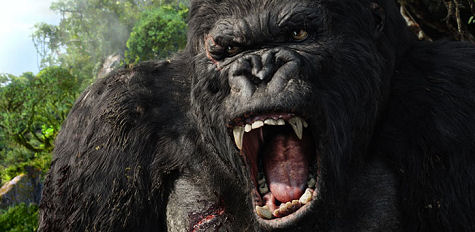
And then I offered a limited apology to its creator, Peter Jackson. “You aren’t that bad, bro,” I said. “You got a few things right this time. The movie is going to lift audiences out of their seats. And I need to say ‘I’m sorry’ for bashing you so much because you’ve almost whacked the ball out of the park this time.”
Almost, I say.
King Kong is too lumpy and draggy during the first hour or so to be called exquisite or masterful, but there’s no denying that it wails from the 70-minute mark until the big weepy finale at the three-hour mark. Monkey die, everybody cry.
< ?php include ('/home/hollyw9/public_html/wired'); ?>
The emotional support comes from the current between Kong and Naomi Watts, who is pretty much the soul of the film. I was concerned that the tender eye-rap- port between them would be too much, but it isn’t. It’s relatively restrained and subtle and full of feeling.
And Andy Serkis’ Kong performance doesn’t play like any kind of “Gollum Kong” (which I fretted about a year and a half ago in this space), and in fact he creates something surprisingly life-like, or do I mean ape-like?
The good ship Kong starts out with a spirited montage (scored with a classic Al Jolson tune called “I’m Sittin’ On Top of the World”) that shows what Depression- era 1933 New York City probably looked and felt like on the streets. The recrea- tions of this bygone Manhattan are awesome, immaculate…CGI illusion at its most profound.

So the first ten or so minutes are fine, but then things start to get lunky and pokey and meandering, and the dialogue becomes increasingly stiff and speechy, and before you know it Kong is close to crashing on the rocks and suffering a gash in the hull.
It’s very touch-and-go from roughly the 10 to the 65- or 70-minute mark. I was shifting in my seat and going “uh-oh.” But things take off once Kong snatches Watts, and the energy stays high and mighty from there to the finale.
You can break Kong down into three sections…
(a) The draggy 70-minute first act, which is all New York set-up, character exposi- tion, the long sea voyage to Skull Island, tedious philosophizing and no action to speak of;
(b) the breathtaking, nearly 70-minute Skull Island rumble-in-the-jungle section, including the breathtaking dino-run sequence (an absolute instant classic that’s likely to drive most of the repeat business in and of itself), Kong vs. the T-Rex trio, and the icky spider-and-insect pit sequence;
(c) the 42 or 43-minute New York finale with Kong on-stage, breaking the chrome- steel chains and escaping, trashing Manhattan, finding Watts, and facing planes and fate atop the Empire State building.
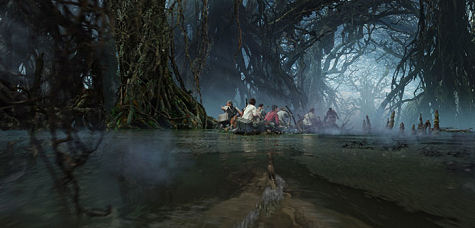
If I were a 14 year-old kid talking to friends about all of us seeing Kong a second or third time, I would suggest that everyone try to slip into the theatre after the first hour because who wants to sit through all that talky crap again?
Kong isn’t better than Jackson’s Heavenly Creatures because it’s almost entirely about enthusiasm and has almost nothing to do with restraint (bad word!), but it’s still the most thoroughly pulse-pumping, rousingly kick-ass film Jackson’s ever delivered, and respect needs to be paid.
And I mean especially by someone who’s been bashing the pud out of Jackson for the last four years or so, calling him an indulgent (and overly indulged), excessive, paint-splattering “wheeeeee!” director all this time.
Make no mistake — Kong shows Jackson is still all of these things. But Kong is a movie with a big heart and a stupidly exuberant joie de cinema coarsing through its veins…during the second and third acts, I mean.
And even though Jackson has gone way beyond the point where he’s able to show minimal respect for physics and could-this-happen? issues of logic and probability …a point from which he’ll never return…he manages such amazing visual feats and surges once the film takes off that all objections are moot. Even if some of the action scenes are cartoonishly wham-bam and ridiculous.
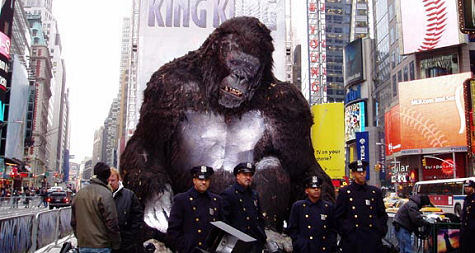
Life-size Kong model currently sitting in Manthatan’s Times Square
I’ll get into this a bit more later in the week, but I felt I had to cop to the fact that Jackson has hit one deep into center-left field.
Jack Black’s Carl Denham isn’t at all bad (he’s mouthy and slimy, but he doesn’t reach for outright comedy), Adrien Brody inhabits the playwright-hero to sensitive perfection, and Kong’s snaggle tooth is glimpsed only a few times and a non-issue.
Sometime next week I’m going to run a list of things in King Kong that make little or no sense (and it’s a long list), but right now it’s simply time to acknowledge that the parts of the film that get your blood racing and your emotions worked up work really well.
[Incidentally: I wrote last night that King Kong starts with an overture taken from Max Steiner’s original score for the 1933 film. However, I learned today [Monday] that Steiner’s overture was played before the presentation of Jackson’s film as a mood-setter by the people in the projection department at the Academy of Motion Picture Arts and Sciences theatre, so it isn’t attached to the film and won’t be heard by regular audiences. That’s a shame.]
Narnia Good
I am not, never have been and never will be a big fan of eye-candy fantasy flicks about adventure, young heroes, holy grails, scary monsters, nice-guy monsters and waves of pseudo-profound emotion, but…
I was quite impressed and moved, even, by Mark Johnson and Andrew Adam- son’s The Chronicles of Narnia: The Lion, the Witch and the Wardrobe (Disney, 12.9)…and go figure. This surprised me, given my general loathing of poster-paint family-friendly films. But it’s a very satisfying movie of this type, and my personal favorite since…I don’t recall but it’s been a while.
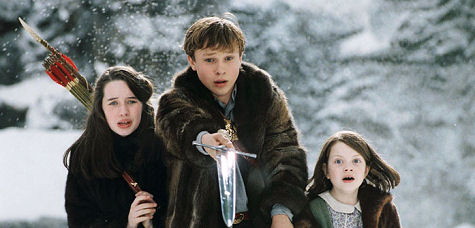
Anna Popplewell, William Moseley and Georgie Henley in Mark johnson and Andrew Adamson’s The Chronicles of Narna: The Lion, The Witch and The Wardrobe (Disney, 12.9)
I’ll make it clear again: I respected Peter Jackson’s Lord of the Rings trilogy for the craft, feeling and exactitude he invested, but sitting through those three films was, on a deep-down personal level, agony. And I’m so sick of the Harry Potter series I can’t make myself see the latest installment. I’d rather have my appendix removed.
I was grimming up for more of the same as I drove to the Narnia screening yester- day afternoon. A Wizard of Oz-like magical-mythical kingdom, child actors, talking animals, CG digiscapes…I’m a man, I can take it, lay it on me.
Then the lights went down and everything changed. In a way it’s the same old magical fantasy action formula, but in several other ways it isn’t for the simple reason that it’s very well composed. In the ways that really count, Narnia is fairly exceptional.
It’s a tighter, far better thing than any one of the Rings films, in part because it’s thoroughly British (it’s based a series of novels by C.S. Lewis) with the bookend sections set in the early 1940s, which saves it from the odor and attitudes of 21st Century trash culture.
The talking-animal CG is about as good as current technology allows, which isn’t perfect but acceptable. The New Testament allegory stuff is plain as day, and it’s easy to see why multitudes of families and Christian right groups are going to support this sucker big-time.
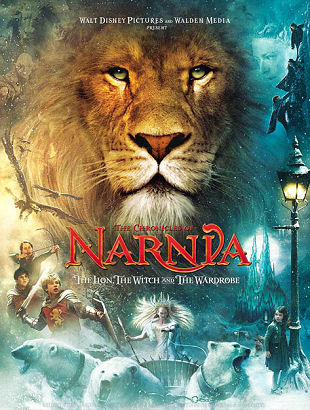
And three of the four child actors (Skandar Keynes, William Moseley, Anna Popplewell) are good enough to make you weep with relief…no Hayden Christen- sen-level performances! And the lead, 10 year-old Georgie Henley, is so skilled and centered and wonderfully sublime she should move right into the Best Sup- porting Actress lineup.
And the script (written by Ann Peacock, Christopher Markus, Stephen McFeely and Adamson) moves right along with plot turns and character motives that hold water and fit right into the whole.
And Adamson, bless him, doesn’t wallow in overbaked emotion the way Jackson always has. Adamson hits the mark, conveys a story point, exudes the feeling and moves on. I don’t mean to upset the Jackson fans but the stuff Adamson is show- ing is called (watch out for the bad word!) discipline.
And it has a perfect ending, by which I mean a perfect final line.
Disney and Walden Media have spent $150 million on this debut in what will probably be a new franchise series, and the money is very much on the screen. The battle scenes are exciting, the various CG-scapes are first rate, and all the talking beavers, wolves, bisons, foxes, lions and tigers are…well, good enough.
The tale begins when the German bombing of London early in World War II results in the four children characters — Peter (Moseley), Susan (Popplewell), Edmund (Keynes) and Lucy (Henley) — to move to a big country estate owned by a kindly white-haired professor type (Jim Broadbent).
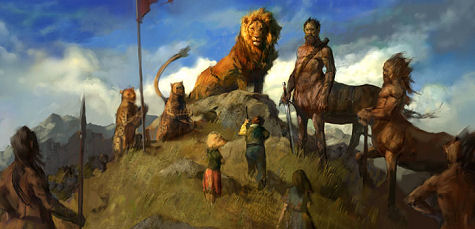
A painting and not a representation of any The Chronicles of Narnia scene in the film.
Then a game of hide-and-seek reveals an enchanted armoire full of fur coats, which turns out to be a passageway into the snow-covered world of Narnia. This ice-and- snow kingdom is populated, we soon learn, by talking animals and opposing armies — the baddies led by the White Witch (Tilda Swinton) and the goodies led by the wise and kindly lion called Aslan (voiced by Liam Neeson).
The arrival of the four kids shakes everything up. Edmund, lured by dreams of being crowned king, is captured by the White Witch and soon betrays his siblings as well as a half-human, half-goat character (played by James McAvoy and called a “faun”) along with the good-guy forces.
But Edmund eventually saved from the White Witch’s grasp by Aslan’s decision to not only forgive Edmund but sacrifice himself.
There is much more to Aslan’s story, but it’s clear early on that this lion is a stand-in for Yeshua of Nazareth, which should indicate that his submission to the White Witch and her schemes in the third act is not necessarily final or binding.
Neeson (who replaced Brian Cox when the producers felt his reading wasn’t sufficiently spiritual or soothing) conveys just the right tone of lordly wisdom and authority. Ray Winstone and Dawn French voice a pair of married beavers, Rupert Everett plays a fox, and Broadbent’s professor — a live-body performance — is just right.
There’s a big battle scene that’s said to be based in large part on a similar show- down in Mel Gibson’s Braveheart, but it reminded me more of the one staged in Spain by Stanley Kubrick for Spartacus.
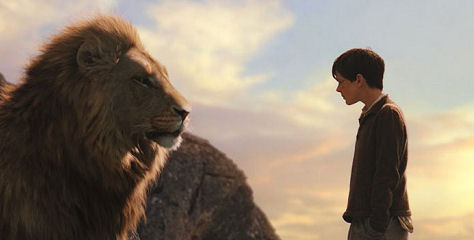
Aslan, the wise and compassionate Christ figure voiced by Liam Neeson, and Skandar Keynes’ Edmond character having a heart-to-heart
Donald McAlpine’s lensing looks beautiful, and the music by Harry Gregson-Will- iams…well, I can’t remember it to be honest, but if you can’t hear a score that’s supposed to mean it’s pretty good. The special effects chores were shared by three companies — Rhythm & Hues, Industrail Light and Magic and Sony Pictures Imageworks.
(One CG complaint: there are too many German planes in the air in a too-tight formation during the London bombing sequence at the very beginning. Too much like a video game.)
Most of the indoor footage was shot in New Zealand, and the outdoor stuff was captured in that country also on top of locales in England, Poland, and the Czech Republic.
I asked an east-coast critic friend who was at the Arclight screening what he thought, and he said, “I was bored out of my skull.” And he said he really liked the Rings trilogy. I said I felt just the opposite. Maybe I’ll be in the minority among the smarty-pants set, but this thing works, delivers, satisfies.
Maybe a crankhead like myself liking this film means something…the film might be fantasy movie for people who don’t like fantasy movies …or maybe it doesn’t mean a damn thing.
Here’s an interesting Guardian piece , by the way, that goes through the whole Narnia world, A to Z.
Ghost in the Machine
I obviously realize that Spike Jonze’s “Pardon Our Dust” Gap TV ad is, speaking superficially, nothing more than a clever marketing ploy by Gap marketers to try and make their chain stores look newly cool to the under-30s who used to shop at Gap stores but have lately been floating away and shopping elsewhere.
The company has simply paid Jonze, a very hip TV commercial director as well as a respected feature film director (Adaptation, Being John Malkovich), to portray the Gap as a hip outfit by showing a bunch of people (mostly 20-something Gap employees) giving the “old” store the finger, in a manner of speaking.
Jonze does this by showing several young Gap workers spontaneously destroying the Gap store they’re working in, which very quickly inspires passers-by to start doing the same.
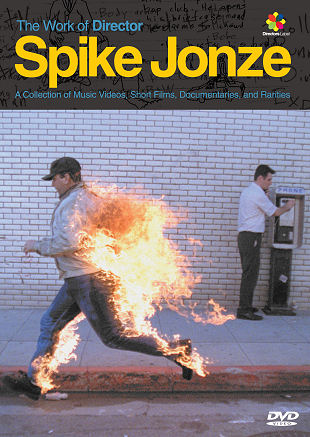
The basic theme of “Pardon Our Dust” is, of course, to let everyone know that Gap stores are adopting a brand new look. But there is much more going on here. (Or in the “good version” that uses Edvard Grieg’s “Peer Gynt Suite” on the sound- track.)
It’s an ad with two equally valid messages — one serving the Gap and the other expressing (and I’m perfectly serious) feelings of genuine anger and resentment that I believe are out there and sitting inside anyone and everyone with a pulse.
Just because Gap marketing executives are winking at Jonze and going, “Yeah, we get it, Spike…cool” doesn’t mean the angry meaning of the ad — the social current that gives the ad that special kick — isn’t there.
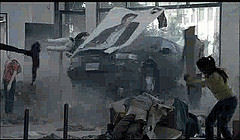
Bit from Spike Jonze’s “Pardon Our Dust” Gap TV spot.
When Network‘s Howard Beale let go with his “I’m mad as hell and not going to take this anymore” war cry, everyone at UBS saw this as sad evidence of a middle-aged man having a nervous breakdown. Only Faye Dunaway’s Diana Christensen character realized he was expressing “a popular rage.”
The profound and the banal coexist in any realm of art and commerce. With any strong statement or declaration there is always the blah interpretation (“big deal …it’s just another TV ad”) and the “oh, shit, this is amazing!” one.
Gap marketers paid for the “Pardon Our Dust” ad and the company is obviously (or at least presumably) benefitting from the buzz. But there’s also a ghost in the machine element going on here — a projection-slash-detection of what’s really being said.
For me, “Pardon Our Dust” is not just one of the funniest and most outrageously brilliant TV ads I’ve seen in a very long time — it’s also a mini-Fight Club piece. It’s cute and funny, okay, but it’s also saying “screw the monotony…screw the corporations… screw Starbucks, Kinkos, Mrs. Field’s Cookies, Foot Locker, etc.”
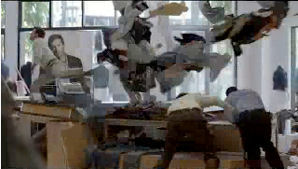
Same spot
It’s about rebellion and revolution against the spreading influence of corporate-run chain stores and a vague sense of attitude control that’s part of this phenomenon of resignation, which “Fight Club” author Chuck Palahniuk was onto years ago.
The Fight Club malaise is about the presence of fewer and fewer big companies …more and more design uniformity in shopping areas …everyone shopping like zombies in exactly the same stores in Terre Haute, Portland, Savannah and Galveston… everyone drinking the same Starbucks mocha latte frappes…everyone going home and watching the same flat-screen TV while sitting on the same IKEA couches.
David Fincher’s Fight Club was partly a rallying cry against a feeling people are sharing about living, working and trying to break through corporate 21st Century culture, and it doesn’t fucking matter if the Gap bosses have enhanced their image with the Jonze ad or are increasing their market share because of it.
“Pardon Our Dust” is still an object d’art of sorts.

It shows young people exploding with fury and not just tearing down sheetrock and support beams and shelves and wall panels, but slashing away at blown-up black-and-white ads of Gap models and throwing stuff out on the street and smashing windows. It’s obviously not about making way for a new design, but about rage against the machine.
And by the way: if you want to see the horribly scored deballed version of this same ad…deballed and trivialized because the “Peer Gynt Suite” has been replaced by a goofy-sounding VH1 pop anthem….an anthem that basically says “something really wacky is going on…woo-hoo!”…if you want to suffer through this de-Spiked corporate compromise version, here it is.
Gotta Have It
I’ve thought and thought about it, and there’s no way Rachel Weisz’s performance in The Constant Gardener isn’t at the very top of the Best Supporting Actress con- tender list.
Why? Because her portrayal of Tessa Quayle, the soul of this highly charged poli- tical thriller, burns the brightest from within.

Rachel Weisz, star of Fernando Meirelles’ The Constant Gardener, at the Peninsula Hotel — Thursday, 12.1.05, 1:25 pm.
When we first meet her, Tessa is a deeply impassioned London leftie with her heart sewn into her shirt-sleeve. Too plainly. When she gets to Kenya with her diplomat husband Justin (Ralph Fiennes), her compassion for Africa’s poor and disdain for corporate malfeasance are so pronounced that she gets herself killed.
But in death, she awakens Justin’s heart. And in so doing we’re left with the notion that a person isn’t just about who and what they are as their life happens, and that we all linger in different ways by the measure of our family and friends.
Who’s been better this year? I’ve gone down the list and nobody’s really stood up to Weisz’s brush-fire of a performance.
The one who comes closet is Scarlett Johansson’s neurotic actress- without-a- rudder in Woody Allen’s Match Point. She has a tragic dimension, but one that stems from bad luck rather than a humanistic choice, which is what fells poor Tessa.
Shirley MacLaine’s In Her Shoes grandmother is perfect but restrained — a perfor- mance composed of precise little flicks of the wrist.
Diane Keaton in The Family Stone is sharp and lively with a hurting maternal thing going on, but it’s not what anyone would call a reach-for-the-stars, pull-out-the- stops performance.
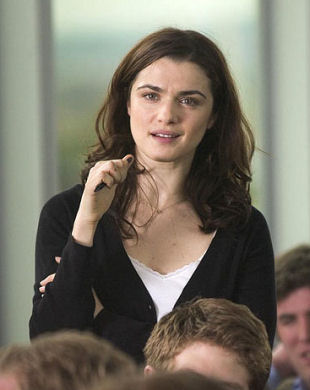
As Tessa Quayle in The Constant Gardener
Uma Thurman is ripe and vivacious in The Producers, but this sort of thing isn’t award-level…forget it.
Gong Li is obviously a feisty Bette Davis bitch in Memoirs of a Geisha…doing it as best she can. But she’s speaking English all through it, and she’s part of an astonishingly stupefying film.
Michelle Williams doesn’t have enough screen time or peak moments in Broke- back Mountain.
I met with Weisz yesterday (Thursday) for an intriguing 24 minutes in the Garden Room of the Peninsula Hotel, during which we talked about …well, four or five things. Briefly. Between digressions and jokes and ordering of salads and refusings of bread.
Topic A was the new wave of political movies that have been landing in theatres, about which Ben Svetkey wrote a very smart, on-top-of-it piece in last week’s Entertainment Weekly.
The notion is that 9/11, terrorism and the war in Iraq are triggering the same kind of uncertainties that led to the noirish paranoid wave of films in the ’70s like The Parallax View, All The President’s Men and Three Days of the Condor.
Signifying the current of today’s disquiet and anxiety are Syriana, Good Night and Good Luck, Lord of War and The Constant Gardener.
There’s also The Good Shepherd, a CIA historical drama due to open sometime in ’06 (I think), plus at least three 9.11 movies (Oliver Stone’s buried-under-the-rubble drama, Paul Greengrass’s Flight 93 real-time drama, and Mike Binder’s Reign Over Me, which will star Adam Sandler as a guy who can’t get over his wife and kids having been in one of the planes that slammed into the twin towers).

Same hotel, same day, 1:27 pm.
The big ogre in all these films, Weisz believes, are corporations — always behind the dirty work, always pushing for suppression of the truth, always with the sociopathic rationales.
We also spoke about her next film, The Fountain (Warner Bros.), in which she stars with Hugh Jackman. Directed and written by her husband…I’m sorry, her boyfriend Darren Aronofsky. It may make its first appearance at the Cannes Film Festival in May ’06, she said. Aronofsky has only recently finished cutting it.
Here’s a link to a recently-up Fountain teaser.
The IMDB log line says The Fountain is about three parallel stories spanning over a thousand years, all concerning love, death, spirituality and the fragility of our existence in this world.”
Fragility of existence? What isn’t fragile? What isn’t transitional and ethereal or on the brink of dying or extinction, or about to be shuttered or down-sized? I feel fra- gile as shit when I’m riding my bike down Wilshire Blvd. and some hyper twenty- something in a black Beemer is making an impulse turn and almost knocks me over.
I’ve had an up-and-down time with Weisz over the last five or six years. Mostly pleasurable, but with two or three detours.
I loved that sex scene she shared with Jude Law in Enemy at the Gates. It took me a while to forgive Weisz for starring in those two Mummy movies. But I eventually got past that and then fell for her in Neil LaBute’s The Shape of Things (the film, not the play). Then Weisz made Constantine and I got depressed and pissed all over again. Then she redeemed herself with The Constant Gardener .
If you’re an actor in the big-time, there’s no getting around having to make shitty expensive movies to pay the bills. I’m sorry for this but that’s life.
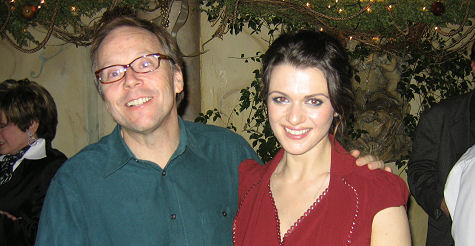
Constant Gardener director Fernando Meirelles (l.), Weisz at party at Il Cielo on Burton Way in Beverly Hills — Friday, 12.2.05, 6:50 pm.
Weisz hit Los Angeles two days ago (Wednesday) and is now making the press rounds with her Constant Gardener director Fernando Meirelles. It’s 4:10 pm and I’m due to be at a party they’re going to attend at Il Cielo in less than an hour and I’m not even dressed.
There’s a lot more to say about Weisz, but just click on this sound file and you can hear 80% of the interview. I lost the last 20% due to shortage of memory… brilliant. Life isn’t just a daily spiritual and physical challenge, but a technological one.
I lightly danced around a question that you’re not supposed to bring up with actresses. Weisz is currently rail-thin and extremely model-pretty, which raises the fact that she looks somewhat different in Gardener due to a scrubbed-face look (i.e., no makeup) and the slight presence of chipmunk cheeks.
I knew it was a bad question to ask so I didn’t ask it — I wimped out and twinkle- toed my way through a non-question while managing to underline how good she looks now — and that was that and we said our goodbyes and yaddah-yaddah.
Weisz is one of the best we have right now, and she’s got a while to go before she hits 40 and starts having to scramble for the few good parts that are written each year for women of years, character and seasoning.
She told me that Aronofsky, like myself, hates the mentality behind the Jane Aus- ten books and has said to Rachel that “you couldn’t pay me” to see Pride and Prejudice. Well spoken, good man.

Grabs

Envelope reporter Elizabeth Snead, Constant Gardener director Fernando Meirelles, Hollywood Reporter columnist Anne Thompson at Il Cielo — Friday, 12.2.05, 6:25 pm.

Front yard of pre-war home on Orlando Street in West Hollywood — Wednesday, 11.30.05, 8:40 pm.
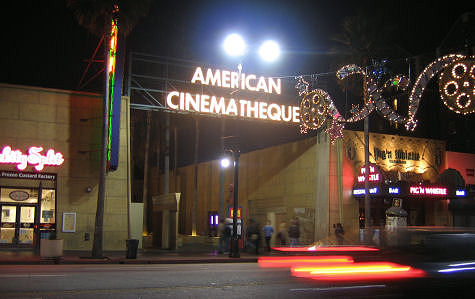
Exterior of Egyptian theatre, home of the American Cinematheque on Hollywood Blvd. near Las Palmas — Wednesday, 11.30.05, 9:35 pm.
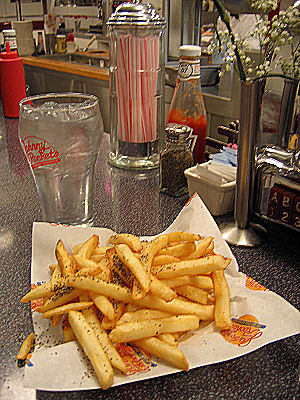
Satisfying a health-food urge at Johnny Rockets — Tuesday, 11.29.05, 10:05 pm.
A friend from London named
A friend from London named Grant Kempster just wrote and said, “Just got back from seeing King Kong this morning, and in a word…’Wow!’ Looks like Spielberg could do with learning a thing or two from Jackson when it comes to making blockbuster event films. I’d love to know what you think, but I can’t tell you how much I enjoyed it. It’s not flawless, but a damn entertaining movie that works magnificently considering it’s a ‘pet project.'”
Richard Schickel’s Time magazine cover
Richard Schickel’s Time magazine cover story about Steven Spielberg’s Munich is now online, but you can’t read it unless you’re a Time subscriber. It’s called “Spielberg’s Secret Masterpiece” on the cover (along with Spielberg’s bearded puss), but the page title is “Spielberg Takes on Terror.” It begins with this graph: “The first and most important thing to say about Munich, Steven Spielberg’s new film, is that it is a very good movie — good in a particularly Spielbergian way. By which one means that it has all the virtues we’ve come to expect when he is working at his highest levels. It’s narratively clean, clear and perfectly punctuated by suspenseful and expertly staged action sequences. It’s full of sympathetic (and in this case, anguished) characters, and it is, morally speaking, infinitely more complex than the action films it superficially resembles — pictures that simply pit terrorists against counterterrorists without an attempt to explore anyone’s motives and their tragic implications.”
There’s a new Best Supporting
There’s a new Best Supporting Actress contender in town…10 year-old Georgie Henley, the soul and natural light-beam of The Chronicles of Narnia: The Lion, the Witch and the Wardrobe (Disney, 12.9). She came out of nowhere (i.e., chosen out of a general cast- ing call in England), but she’s Drew Barrymore in E.T. without the cloying I-know-I’m-cute-and-you’re-going- to-adore-me attitude. Henley’s serene little-girl aura…her beauty, obvious intelligence, cultured British accent, etc…plus the generosity of feeling from within make for a potent combination.
King Kong — the brute
King Kong — the brute with a case on a certain blonde, a big guy with an even bigger heart, an ape who isn’t afraid to really express his feelings (unlike most males) — will have its AMPAS debut this evening at 7 pm at the Academy theatre. The word from last week’s New York junket screening is that Peter Jackson’s film is not only thrilling but quite the emotional ride. I know it’s going to be a hell of a visual show, but wait…wait…a distribution guy from Europe has seen it and he’s not on Baz Bamigboye‘s train. “It’s too long and boring for my taste,” he begins. “Actually I have a theory that King Kong is a manifestation of Jackson…a kind of dedication and self-tribute from and by Jackson to…himself! It’s a total vanity project. On its own terms the story should unfold in less than two hours, so at least one out of the picture’s three hours is just jacking off. There is one reel containing absolutely no dialogue — just Naomi Watts screaming her lungs out. Jackson knows how to create visual excitement, yes, but he’s too busy proving to the world that he’s the greatest director ever. This is finally a film about emotionless emotion..grand but empty, big but cold.”
